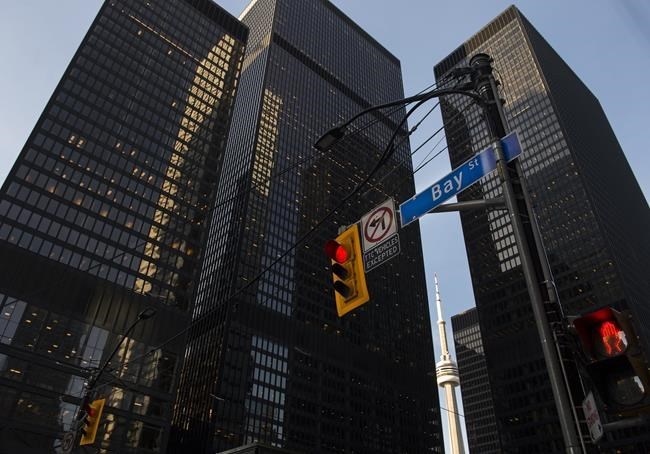TORONTO — North American stock markets reversed an early upward climb as a shutdown of New York City schools heightened concerns about a spread of pandemic lockdowns.
"Pretty much right when that got announced, the market started taking a bit of a downturn, which that obviously leads people to believe that if they're shutting down, there might be more coming," said Michael Currie, vice-president and investment adviser at TD Wealth.
"And that's obviously quite bad for economic activity."
The S&P/TSX composite index closed down 58.24 points to 16,889.82 after reaching an intraday high of 16,990.57.
In New York, the Dow Jones industrial average was down 344.93 points at 29,438.42. The S&;P 500 index was down 41.74 points at 3,567.79, while the Nasdaq composite was down 97.74 points at 11,801.60.
Markets got an early lift from Pfizer announcing that its COVID-19 vaccine is now 95 per cent effective, up from the 90 per cent it announced last week and in line with Moderna's claim on Monday.
"The whole market is trying to balance between the vaccine news, which has been great from either Moderna or Pfizer, and the fact that the cases are still skyrocketing," Currie said in an interview.
Equity markets have been on a tear in November despite Wednesday's blip, with the TSX up 8.4 per cent.
It's a traditionally strong time of the year heading into the Christmas season.
"When it's a really, really powerful uptrend we're in, we're gonna need to see a sizable dip to break us out of that," he said.
The Canadian dollar traded for 76.55 cents US compared with 76.37 cents US on Tuesday.
It got a lift from continuing weakness in the U.S. dollar and support from Canadian inflation numbers that were stronger than expected.
Canada’s annual inflation rate jumped last month by 0.7 per cent compared with one year ago, the fastest the consumer price index has risen in months, largely on the back of higher food prices.
October's increase compared with a year-over-year rise of 0.5 per cent in September.
Materials led the TSX lower, falling 2.7 per cent on a further weakness in gold prices.
The December gold contract was down US$11.20 at US$1,873.90 an ounce and the December copper contract was unchanged at nearly US$3.20 a pound.
Silvercrest Metals Inc. lost 8.2 per cent following by Wheaton Precious Metals Corp. at 5.7 per cent.
Consumer staples dropped 1.8 per cent with shares of Metro Inc. down 2.6 per cent despite reporting strong quarterly results.
Industrials were slightly lower even though Air Canada shares climbed four per cent after Boeing announced that the Boeing 737 Max, which was involved in two mass casualty crashes in recent years, will be permitted to fly again in the U.S.
However, federal Transport Minister Marc Garneau said the aircraft won't be returning to Canadian skies just yet as the country will impose different requirements than the U.S.
Financials led the TSX as with Laurentian Bank up 4.1 per cent, Toronto-Dominion up 1.1 per cent and National Bank 1.4 per cent higher
Energy also rose as crude oil prices continued to climb, reaching an 11-week high.
"It's just a continuation of the uptrend and there's not enough bad news from the COVID side to suppress it any further," said Currie.
The January crude contract was up 36 cents at US$42.01 per barrel and the December natural gas contract was up two cents at US$2.71 per mmBTU.
The sector was helped by a smaller-than-expected increase in U.S. inventory levels, although gasoline stockpiles were much higher than expected. In addition, there's a belief that OPEC plus Russia may change curbs on production.
This report by The Canadian Press was first published Nov. 18, 2020.
Companies in this story: (TSX:LB, TSX:TD, TSX:NA, TSX:SIL, TSX:AC, TSX:MRU, TSX:GSPTSE, TSX:CADUSD=X)
Ross Marowits, The Canadian Press




